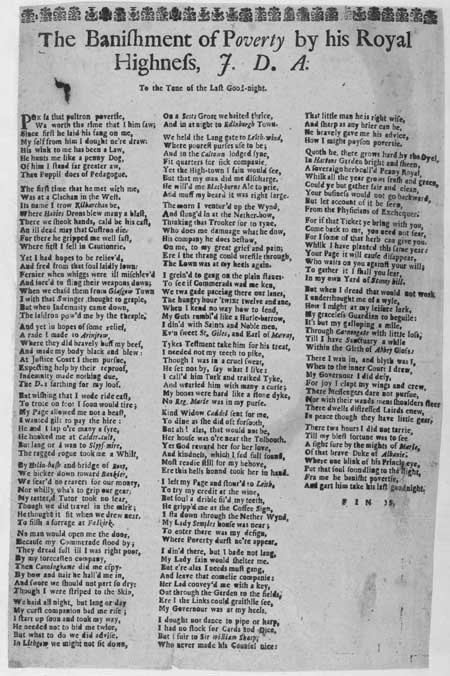Commentary
Verse 1: 'Pox fa that pultron povertie, / Wa worth the time that I him saw; / Since first he laid his fang on me, / My self from him I dought ne're draw: / His wink to me has been a law, / He hunts me like a penny Dog, / Of him I stand far greater aw, / Than puppil does of Pedagogue.' This poem is attributed to 'his Royal Highness J.D.A.' and was to be sung 'to the tune of 'The Last Good-night'. In 'The Banishment of Povertie' the narrator describes, in vigorous Scots, his odyssey through Scotland as he attempts to escape the clutches of poverty. It is significant that his journey starts in Kilbarchan: this is a tribute to 'The life and death of Habbie Simpson, Piper in Kilbarchan', one of the most popular and reprinted of all Scots ballads, which was written by Robert Sempill of Beltrees (1595?-1665?). 'The Banishment of Povertie' is believed to have been written by Robert's son, Francis Sempill (1616-1682), despite the attribution on the broadside. It is written in 'French octave', where the end-rhyme scheme is ABABBCBC, and the metre is iambic tetrameter. Early ballads were dramatic or humorous narrative songs derived from folk culture that predated printing. Originally perpetuated by word of mouth, many ballads survive because they were recorded on broadsides. Musical notation was rarely printed, as tunes were usually established favourites. The term 'ballad' eventually applied more broadly to any kind of topical or popular verse.
View Transcription | Download PDF Facsimile
|
 |
Probable date of publication:
1703 shelfmark: APS.4.94.22
 View larger image
View larger image
|


